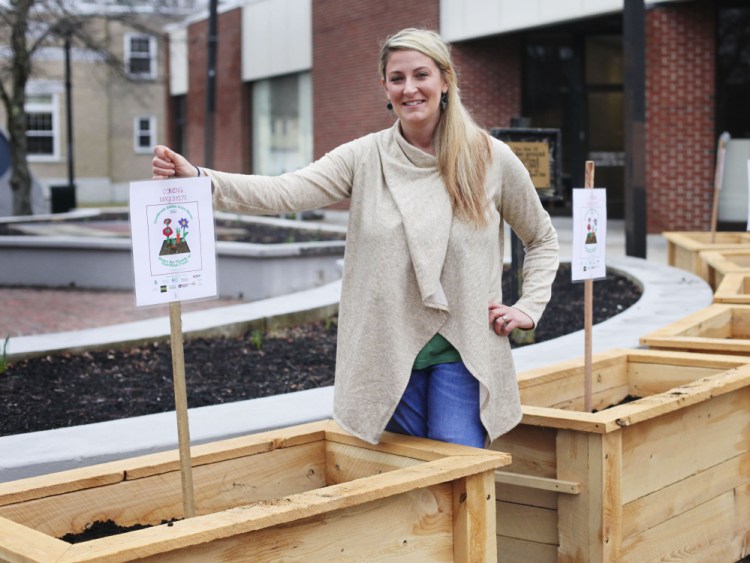Westbrook is growing – specifically, growing vegetables.
The Downtown Westbrook Coalition has installed eight garden planters in Blue Note Park on the city’s Main Street. In May, volunteers will fill them with edible plants such as green beans, cherry tomatoes and herbs. They will be cared for by local businesses and free for the picking to any passer-by.
It’s all part of Edible Main Street, a pilot project led by graduate student and Westbrook resident Allie Harvell.
“I want the community to come together,” Harvel said. “I want people to be educated about food insecurity, and I want people to have access to healthy food.”
Harvell, 31, will soon graduate from the University of New England with a master’s degree in public health. More than half of Westbrook’s elementary, middle and high school students are eligible for free or reduced-price meals and milk at school, based on their family income. Reduced-price and free meal data are often used as an index of poverty, and Harvell said they can be a measure of food security for those children as well.
“The idea is for people to really utilize this resource and really promote the different areas that help people gain access to healthy foods,” she said of the garden boxes.
Other cities in the United States and around the world have incorporated edible plants into their public gardens and streetscapes. In London, the Edible Bus Stop creates garden landscapes in gritty urban spaces. Last summer in St. Paul, Minnesota, an “edible streetscape” introduced pedestrians to unfamiliar flowers, herbs and vegetables used for cooking in other parts of the world. And public fruit trees such as Mount Joy Orchard on Portland’s Munjoy Hill are becoming more common in urban areas.
Edible Main Street in Westbrook is modeled after an initiative of the same name in the town of Norway, Maine.
When Abigail Cioffi at the Westbrook Downtown Coalition heard Harvell’s idea, she was immediately interested.
“It’s nice to have something that has a cool factor, that people want to see and can interact with throughout the season,” Cioffi said. So Harvell and Cioffi began to solicit donations for the project.
LOCAL BUSINESSES PROVIDE SUPPORT
The St. Anthony of Padua parish in Westbrook contributed a grant to buy lumber. Students at the Westbrook Regional Vocational School built the eight boxes. We Compost It, a compost company in southern Maine, donated the soil. Johnny’s Selected Seeds, which has its research farm in Albion, contributed the seeds. The University of Maine Cooperative Extension designed the layout of the plants in the boxes.
Planting will take place by the end of May. The plants will include herbs, cucumbers, lettuce greens, cherry tomatoes, green beans, even edible flowers like nasturtiums.
“We want to have that easy access to have people tear off things and take it with them,” Harvell said.
The planters will be maintained by seven local businesses and volunteers from the community from May until October. Those businesses – Al Nakeel Market, Bank of America, Big Fin Poke, Fajita Grill, Westbrook House of Pizza, Saco Bay Physical Therapy and Tropical Sun Tanning – will also have information inside their shops about Maine SNAP-Ed and other resources related to food security.
“I want to see more people know that there’s resources that can help them gain access to food and be healthy,” Harvell said.
Nikki Anderson works on the SNAP-Ed Nutrition Education Program through Opportunity Alliance. She has been helping students in Westbrook’s elementary schools start the seedlings before they are planted in the boxes next month.
“It involves a lot of patience,” Anderson said. “The first day is not that exciting. When I come back a few weeks later and the plants are 5 inches tall and they can see the flowers on them and it dawns on them that those flowers turn into green beans or tomatoes, they think it’s magical.”
Anderson said she hopes families in Westbrook learn more about both nutrition and their city.
“As far as downtowns go, Westbrook is really up and coming,” Anderson said. “We are just hoping families get outside and spend more time exploring the downtown.”
GROWING POPULARITY IN NORWAY
In Norway, Edible Main Street has been a popular addition to the downtown. Healthy Oxford Hills received a $2,000 grant from Stephens Community Healthcare Foundation in 2014, and the Center for an Ecology-Based Economy started the project with 12 planter boxes in 2015. This summer, Executive Director Scott Vlaun said they are adding four more boxes to the street.
Greens and beans are among the most popular products from the boxes. When Vlaun buys a bagel and cream cheese from the local cafe, he likes to add a couple of leaves from the planter outside to his sandwich. He knows an elderly woman who browses the planters for salad ingredients.
“The kids really seem to love the edible flowers,” Vlaun said. “Once one kid eats a nasturtium, you’ll see them all out there.”
Since the planters started popping up on Main Street, Vlaun said he has received a number of requests from Norway residents who want advice to build their own.
“Ultimately, it just puts food growing in front of people,” he said. “It’s easy to forget where our food comes from sometimes and how easy it is to grow food.”
Harvell is already planning ahead to next summer, when she hopes to see the planter boxes expand in Westbrook.
“Everyone keeps saying, ‘What happens if all the stuff is gone?’ ” Harvell said. “That’s good. I want that to happen. I want people to pick things. I want things to be all gone.”
Megan Doyle can be contacted at 791-6327 or:
mdoyle@pressherald.com
Twitter: megan_e_doyle
Send questions/comments to the editors.


